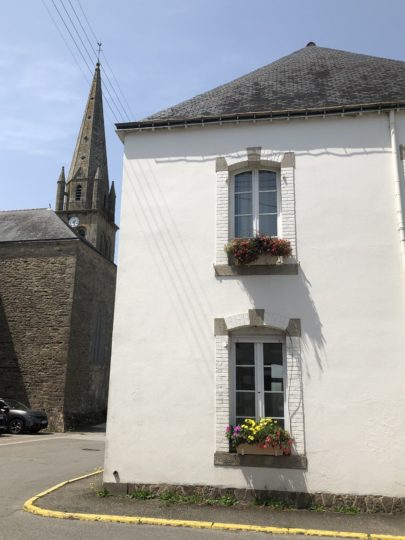HAPPY THANKSGIVING, MY FRIENDS! And speaking of things to be grateful for…
This September, after a very nerve-wracking meeting at the Préfecture (police headquarters), I was told that I would be granted a resident card – a visa to stay and work in France, renewable only every 10 years. What a relief! Last week, I was able to pick up that oh-so-important piece of plastic.
After five years living in France and five Avis d’Impôts (tax returns), you are eligible to apply for a 10-year visa (carte de séjour de 10 ans or titre de séjour de 10 ans). But it is discretionary. And over the years, apparently, they have become stricter and stricter in handing them out. Not having any family ties to France, my fate was pretty much dependant on my income making me a financial plus and not a drag on the French economy.
Not wanting to take any chances, I worked with an immigration lawyer to assemble the necessary documents and schedule a meeting at the Préfecture. The idea is that you bring all the documents with you to your meeting, your officer reviews them all and asks follow-up questions while you look on, he or she consults with his supervisor while you pace the waiting room, then calls you back to announce whether you can stay or you must go. (That’s not quite true – I imagine they have the authority to grant another 1-year extension of your visa and not the 10-year visa should they think this most appropriate.)
According to my immigration lawyer, it was imperative that I not switch jobs, and certainly not take a pay cut, even a minimal one, before receiving the 10-year visa. It helps to show continuity and certainly a decent salary (i.e. tax liability).
For documents, I brought with me (in original and duplicate), every possible document that could feasibly show 1) my income in France and my tax payments, and 2) my integration into French society, both financially and in terms of language ability and cultural assimilation.
The exact list may differ depending on your exact situation, but below are the documents that I brought with me (and it worked!) Those documents indicated with an asterisk are those I had available so I brought them along just in case, even though my immigration lawyer did not specifically instruct me to do so:
- My French work contract (showing that I am a salariée, or fixed-salary employee, with a CDI, or contrat à durée indéterminée, meaning the contract has no term and I cannot be fired except for serious cause – not “at will” employment as in the U.S. The French want to see that you will not become unemployed anytime soon.)
- A letter from my employer stating that I am indeed a salaried employee in good standing since August 2007, with a monthly salary of no less than €X (gross).
- A certificate from the U.S. Government showing that I was eligible for and paid into U.S. social security from 2007 through August 13, 2012.
- A copy of the request submitted by my employer for a French social security number, showing that as of August 14, 2012 I am in the French system. Ideally, you would have your social security number and carte vitale (health insurance card) already.
- *A letter from my mutuelle (top-up private health insurance) showing that I am covered as of August 14, 2012. I figured this couldn’t hurt as I did not yet have my social security number yet.
- My bulletins de paie (pay stubs) for each December since my arrival and also for the preceding 12 months. The officer at the Préfecture was apparently annoyed that I only had the last 12 months and not all of 2011.
- My last (and only) five Avis d’Impôts, showing definitely what you owe for each tax year. You will usually receive them around August of September.
- My acte de vente, showing I have the title to property in Paris.
- Proof of my co-propriété charges (essentially condo fees). Basically more proof that I own an apartment in Paris.
- Proof of my homeowner’s insurance
- *Proof of mortgage insurance
- Most recent EDF (electricity) bill.
- Lease agreement for the house I am renting in Brittany. I mean seriously, who signs a 3-year lease on a house in rainy, cold Brittany if you are not fully integrated into French society?
- Medical certificate from the French government from when I first arrived in 2007, stating that I did not have tuberculosis. (Apparently they don’t care if I got tuberculosis since, as long as I didn’t have it when I arrived.)
- *Certificate from the French government from when I first arrived in 2007, showing French language competency.
- *Certificate from the French government from when I first arrived in 2007, showing that I completed a one-day formation civique (civic class). Note, you may not have this as it seems only those who arrive on certain visas are required to take this class.
- *Certificate from the French government from when I first arrived in 2007, showing that I completed a one-day session d’information sur la vie en France (class on life in France). Note, you may not have this as it seems only those who arrive on certain visas are required to take this class.
- *Certificate from the Institut de Français, showing that I completed, and received a commendation in, a 4-week intensive French language course.
- *Results of the TCF exam (teste de connaissance de français). This is an exam required for nationality, not the 10-year resident visa, but I took it anyways as I had a bit of extra time this summer. I figured it couldn’t hurt to show as much proof as possible that I do indeed speak and understand French.
- *My birth certificate
- My resumé and transcripts from Dartmouth College and Georgetown University Law Center, as well as French translations. I was asked for “diplomas” but I really don’t know how to photocopy American-sized framed diplomas and the transcripts list my final grades and the dates the degrees were conferred. I was not required to get an official translation from a sworn translator (a traducteur assermenté) for the resident card, but you would for a nationality application.
- A lettre de motivation – a letter explaining a bit about your background, how you have assimilated and why you deserve to stay in France. My lawyer wrote it for me (but I signed it).
- Four passport photos (though in the end, they only took three of them). It’s best to go to a real photo shop and not a metro photo booth as the specifications are quite strict. Here they are in French to show the professional photographer (it still should only cost you about €10): Les photos devront être de format 3,5 X 4,5 cm (1,4″ X 1,9″). Le portrait tête nue et sans lunettes doit être représenté de telle manière que seul le haut des épaules (ou la base du cou) soit visible. La taille du visage doit être comprise entre 32 mm et 36 mm ou doit occuper 70 à 80% de la photo. Le visage doit être correctement centré sur la photo. La prise de vue doit dater de moins de six mois et être parfaitement ressemblante au jour du dépôt de la demande et du retrait du titre. Le fond doit être de couleur claire (bleu ou gris) mais ne doit pas être blanc.
If you have recently arrived in France but you may someday apply for a resident card or nationality, my best advice is KEEP EVERYTHING. Even the most seemingly unimportant documents could be crucially important in the eyes of the Préfecture. In particular, do not throw out any of the documents you were given when you first arrived, any pay slips or anything to do with taxes. If you are nearing your 5-year mark and are gearing up to apply for the 10-year card, it’s never too early to start getting organized!
Bonne chance!
***
Have you gone through the process of obtaining a 10-year resident card? Do you have additional tips to share? Please do!




